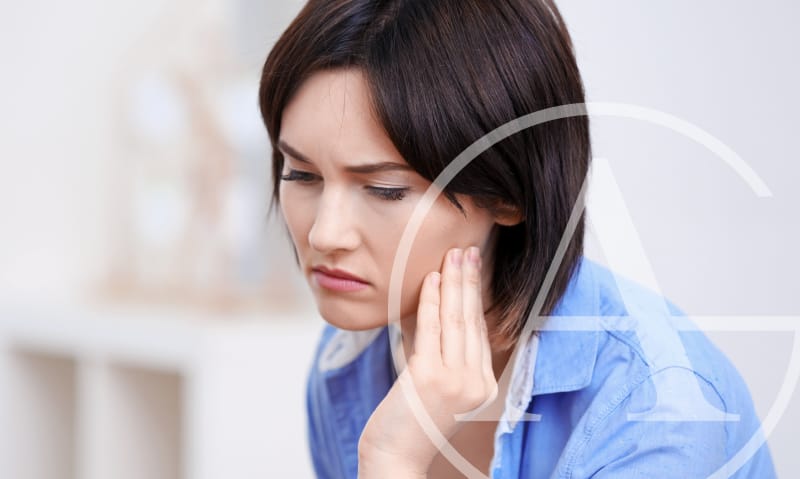What Is the Main Cause of TMJ Disorder?

Why does my jaw hurt so much?
It’s bedtime after a busy day at work. You’re ready to crash and get some sleep, but as you lay down ready to relax, sleep couldn’t be further away. Right below your ear, at the socket of your jaw, you feel a shooting pain that radiates down to your shoulders and neck. Or maybe it’s a dull ache, and your facial muscles feel tight and strained. Perhaps you’re experiencing a pounding headache along with your jaw pain.
Does any of this sound familiar? TMJ disorder can present with quite a few different symptoms. These symptoms can be distressing and even make it hard to sleep and eat. If you’re reading this and you can relate to the frustration, you’re not alone. One in 10 people are impacted by TMJ disorder. So, what is it and what is the cause of TMJ?
Understanding the Temporomandibular Joint
Let’s first talk a bit about the temporomandibular joint. That word alone is a mouthful! People commonly refer to the temporomandibular joint as TMJ, and the acronym for TMJ disorder is TMD. The TMJ is a ball and socket joint and you have two of them, one on each side of your face. This synovial (fluid-filled) joint acts like a sliding hinge, connecting your jawbone and skull. The TMJ allows for complex movements that no other joint in your body can perform in exactly the same way. Both of your temporomandibular joints work together, and its unique function allows the jaw to perform a much wider range of movements than other joints can.
So, what causes TMD?
The National Institute of Dental and Craniofacial Research defines TMD as a group of 30 or more conditions that cause pain and dysfunction in the jaw joint and in the muscles that control jaw movement. In fact, TMD can be divided into three general categories:
- Disorder of the joint or discs.
- Disorder of the masticatory muscles (the muscles used for chewing).
- Headaches associated with TMD.
It’s possible to have TMD that falls into more than one of these categories.
A variety of things could be causing your TMD, such as a history of injury or trauma to the joint, stress and anxiety, inflammation from osteoarthritis or rheumatoid arthritis, misaligned teeth, or teeth grinding (bruxism). But often symptoms can arise without an obvious reason and it can be hard to pinpoint where the disorder came from.
In general, the cause of TMJ is by something being out of alignment.
Misalignment and Temporomandibular Joint Dysfunction
How is misalignment the cause of TMJ? If even the tiniest thing is out of alignment, it offsets the entire balance of the joint system and the body compensates by making one muscle more dominant. This, in turn, can put stress on those muscles, causing inflammation and pain.
The idea of neuromuscular dentistry was introduced by Dr. Bernard Jankleson in the late 1960s. He examined the relationship of the upper and lower jaws and proposed the idea that when the teeth, jaw muscles, and TMJs are not in alignment, TMD can result.
This misalignment causes a ripple of effects throughout the whole body, putting stress on the face, head, neck, and shoulders. There’s even a connection between poor posture and TMD, and the connection goes both ways. TMD can cause poor posture and poor posture can cause TMD.
Other TMJ Symptoms
TMD can definitely affect you in ways other than just jaw joint pain. Some other symptoms include pain and discomfort in your ears when moving your jaw, earaches, hearing problems, neck pain, dizziness, swelling, clicking and grating noises when you move your jaw, muscle fatigue, toothaches, difficulty opening your mouth fully, and even having your jaw lock completely.
While these symptoms can be very disruptive, they don’t have to be. There’s help out there and treatment options available.
Get help for your TMJ disorder at Dallas Cosmetic Dental.
If you’re suffering from TMD, there is help available and that starts with a visit to your dentist. Dr. Alhadef will make a diagnosis based on your symptoms and a thorough examination. Dr. Alhadef will decide on the best treatment option or combination of treatments for your specific case. To learn more about how we can help you at Dallas Cosmetic Dental, reach out to us for a consultation.